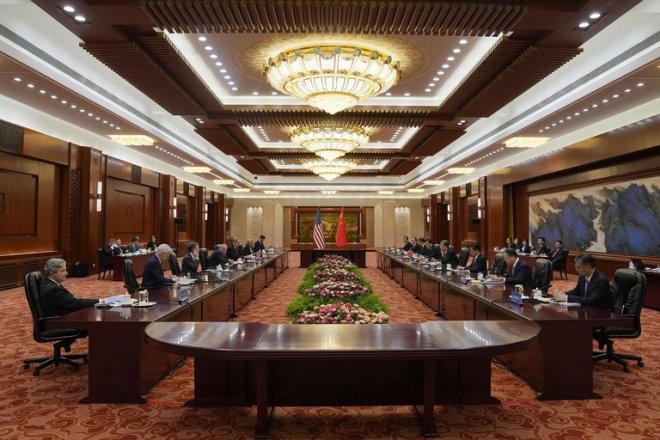Young students brave grueling college exams amid job crisis in China
Police motorcades, guarded fleets of vans carrying exam papers and throngs of mask-wearing teens pouring into gymnasium halls were a common scene across China as a record number of students take the national college entrance exam, or gaokao, this week.The 13 million test-takers is the largest group to sit the exam in a single year since it was reinstituted in 1977 following the Cultural Revolution.
A requirement for gaining a place at university in China, the pressure of sitting the days-long test has been known to bring about fainting and trips to the hospital.
This year, the stress may be compounded not only by the competition from the volume of test-takers, but also by the grim employment outlook being faced by young people in China.
The country is experiencing what appears to be its worst unemployment crisis since the founding of the People’s Republic of China in 1949.
Nearly one-fifth of those between 16 and 24 years old are out of work, according to surveys, and national joblessness is thought to be at levels not seen since the financial crisis of 2008.
The pessimistic atmosphere has renewed criticism of the gaokao system, even as authorities attempt to tamp down on disaffection over perceived economic and educational failures.
No guarantee to a middle class life
According to Wu Qiang, an independent scholar in Beijing, the surge in the number of exam takers is being driven in part by more children of migrant parents participating in the test this year.
 High school students go through exam papers, ahead of the National College Entrance Examinations, known as the gaokao, in Handan, Hebei province, May 17, 2023. Credit: AFP
High school students go through exam papers, ahead of the National College Entrance Examinations, known as the gaokao, in Handan, Hebei province, May 17, 2023. Credit: AFP
But in the current economic climate, they face the prospect of being conscripted into the ‘gig economy’ instead of the more comfortable lives once promised by obtaining a university degree.
“Rather than graduating into the middle class, they become the equivalent of urban migrant workers, delivering food and so on for an income,” Wu said.
Many Chinese parents, especially those from rural areas, regard the college entrance examinations as the only way to change their childrens’ destinies, said Feng Chongyi, associate professor at the University of Technology in Sydney, Australia.
But in reality, they may find disappointment - they invest heavily in school but face bleak job prospects after graduation, said Feng.
“They get a few years of study back home, but it provides them with little in the way of advantages. College majors are not matched for jobs either – a lot of it is way too academic,” he said.
State programs unlikely to help
The market for all graduates - not just ones from rural backgrounds- is difficult.
According to the Global Times, a state newspaper, China will have 11.58 million fresh college graduates in 2023 - a record high.
At the same time, the youth unemployment rate sits at 20.4% for the 16-24 age group, according to data from the National Bureau of Statistics.
 Parents stand and watch as students enter a school to sit for the gaokao exam in Beijing, June 7, 2023. Credit: Andy Wong/AP
Parents stand and watch as students enter a school to sit for the gaokao exam in Beijing, June 7, 2023. Credit: Andy Wong/AP
In an effort to fix the problem, China’s Ministry of Human Resources and Social Security has launched a 100-day campaign to provide more than 10 million jobs for college graduates and other young people, according to state media.
The campaign will target high-demand, scarce and cutting-edge sectors such as health care, information technology, advanced manufacturing and environmental protection. It will also focus on areas with high concentrations of colleges, large numbers of graduates and high mobility of employment.
The ministry will set up an online recruitment platform and hold various online activities such as live broadcasts with jobs, visits to enterprises, video job fairs and cloud recruitment.
It seems unlikely that this latest of China’s innumerable campaigns – in this case dubbed the 100-day, 10-million jobs “Career Leads the Future, Build Dreams in Youth” – will be the magic elixir China needs, however.
Critics say problems of youth unemployment run much deeper - and that it starts with an education system that is clearly not working for many graduates.
Wang, a retired teacher from Guizhou University who only wished to give his last name, told RFA’s Mandarin service he believes the education system is not fair, regardless of how the government promotes employment campaigns.
 Job seekers visit a booth at a job fair in Beijing, Feb. 16, 2023. Credit: Florence Lo/Reuters
Job seekers visit a booth at a job fair in Beijing, Feb. 16, 2023. Credit: Florence Lo/Reuters
“In our country’s traditional culture reading thousands of books is regarded as the way to success,” but restrictive regulations on college admissions means that talented students from small cities and rural areas lose out on places at prestigious schools, he said.
At the same time there is a widespread phenomenon of wealthy families “spending money to buy points” to get their children better admissions scores, which leaves students from less well-off families at a disadvantage.
Other scholars told RFA’s Mandarin service that they agreed the gaokao is problematic.
The exam is too focused on scores and ignores the cultivation of students’ comprehensive quality, they say. Many students give up extracurricular and social activities – as well as other opportunities – in order to pursue good grades.
This leads to a lack of innovation and practical abilities – and many of them end up pursuing menial, low-paid jobs.
Yet speaking up about the problem is risky.
As Reuters noted last year, after Li Xunlei, a well-known economist, reported that over 70 million jobs had disappeared due to the pandemic, his post was deleted and he was removed from his leadership post.
Edited by Boer Deng and Mike Firn.
[圖擷取自網路,如有疑問請私訊]
|
本篇 |
不想錯過? 請追蹤FB專頁! |
| 喜歡這篇嗎?快分享吧! |
相關文章
AsianNewsCast























